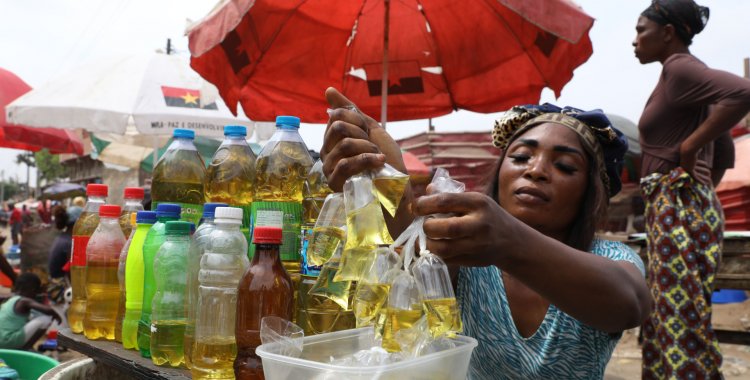The difficulties that citizens go through every day, due to the high price of food and the sharp devaluation of the kwanza, are reflected in nostalgic evocations, which bring to mind the former Angolan President, the now deceased José Eduardo dos Santos or "Zé Dú", as he was popularly known.
If previously the "partner" phenomenon, which consists of pooling money to purchase a certain product, was an option, today, according to the Angolans interviewed by Lusa, it has become an obligatory resource to be able to obtain what is necessary to feed their families.
The acquisition of mini-doses of products, from sugar, cooking oil, salt, washing powder or pasta, has also become a common strategy to "dodge" low income and guarantee minimum subsistence.
Selling a kilogram of beans for 1500 kwanzas, Gisela Paca, 37 years old, a street vendor at Mercado Guarda Passagem, in the municipality of Viana, said that the difficulties in the country have worsened under the government of the President, João Lourenço.
"Now life is bad, João Lourenço has to help us, in Zé Dú's time it was different, look at the oil, I don't know if for a child's massage or even for cooking, this oil costs 100 kwanzas", she says pointing to a mini dose of a few grams of liquid.
"We are selling it like this because a 20-liter bottle costs 40,000 kwanzas", she explains.
Displaying the cooking oil divided into small rudimentary plastic packaging, the trader said that purchasing the oil in that format has been a resource for many to guarantee "matabicho" (breakfast) or dinner, which is often the only meal in the day.
"João Lourenço sees the population that is suffering, Zé Dú's time wasn't like this, we were hungry, but this time it's too much", she lamented.
Also in that informal market, located on one of the streets in the Capalanga area, we met seller Joana Neves, who asked the authorities to intervene to alleviate the galloping rise in food prices.
"We are suffering, have pity on us, you have to have pity on the people, we are suffering", highlighted the trader, recalling that a chicken leg, which currently costs 800 kwanzas, is insufficient to feed eight children in a country where the minimum wage is around 32,000 kwanzas and households have, on average, five people.
"A bunch of mackerel fish (three fish) costs 2000 kwanzas, how many fish do you have to buy to share with your children?", she asked.
Anyone who goes to Mercado da Mamã Gorda, a well-known shopping area in the Urban District of Estalagem, in Viana, with 50,000 kwanzas or 80,000 kwanzas cannot currently guarantee full monthly purchases, even if they become a "member".
Isabel Raimundo, a 67-year-old retiree, took 80,000 kwanzas to Mamã Gorda to buy fresh food for the house, and had to turn to her "partner" for chicken thighs, whose box currently amounts to 16,300 kwanzas.
With another client, recruited by young people who, in these places, undertake this mission in exchange for a few kwanzas, Isabel Raimundo shared the costs for purchasing chicken thighs, which allowed her to purchase other products.
"The prices are always high, I became a partner for one thigh sock and the rest I bought boxes, we became a partner because the money we brought is not enough. I brought 80,000 kwanzas and only 5,000 kwanzas remained, still the purchases are not enough for the month", pointed.
In the fresh produce warehouses in that well-known commercial area, customers and operators complain that prices are rising daily. The box of chicken carcasses already costs 12,500 kwanzas, the box of leftover pork ribs, called "lapiseira", costs 10,900 kwanzas, the box of chicken necks costs 13,600 kwanzas and the box of 10 kilogram sausages costs 28,500 kwanzas, amounts that are unaffordable for the wallets of many Angolans.
Among the hundreds of people waiting there for a circumstantial or occasional "society", taking into account the context of crisis, we found Madalena Mgango who shared the quantities of a box of chicken carcasses with another person.
"I bought a chicken carcass and became a partner because the money wasn't enough to buy a box. I spent 6050 kwanzas, the money wasn't enough to buy fish and chicken and so I had to resort to the carcass", she said.
The 24-year-old pregnant woman also lamented the high prices of the main products in the basic food basket, saying that the purchases she made were insufficient for the family.
To minimize the effects of inflation and save on purchases, hairdresser Paula Mucoco brought 50,000 kwanzas to share with her "partners".
"I came to shop, but unfortunately the prices are very high, we can no longer buy a box of chicken alone and we have to do everything together, it's really not easy, everything is very expensive", highlighted the 35-year-old hairdresser, adding: " Thank God the partner is helping us a lot."
To avoid high prices, many citizens also choose to make purchases, which they call "pickups", at the end of the day, in parallel markets, when sellers want to "dispatch" the goods and make prices more affordable.







